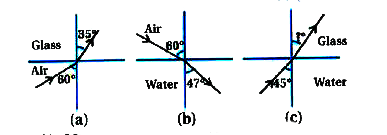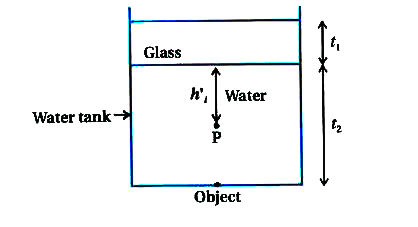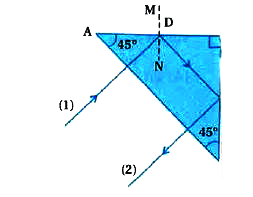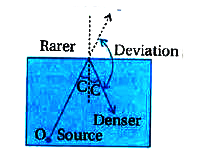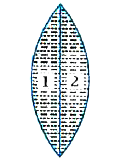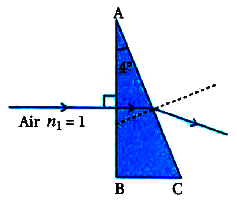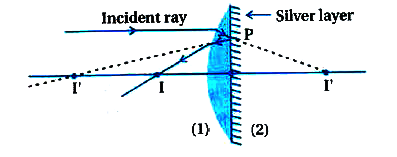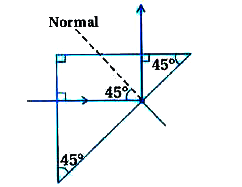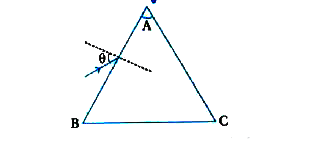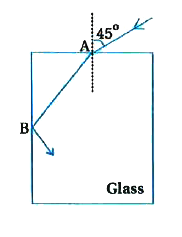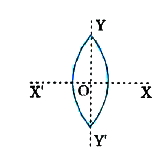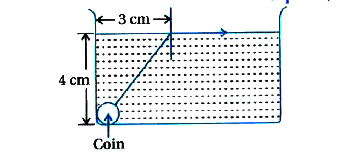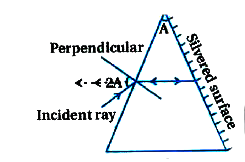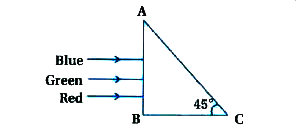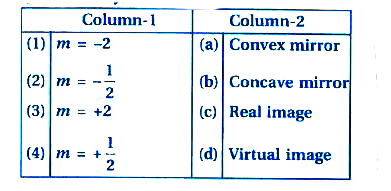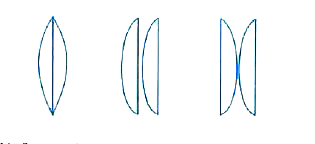SECTION-D (MULTIPLE CHOICE QUESTIONS (MCQs))(MCQs ASKED IN COMPETITIVE EXAMS) from KUMAR PRAKASHAN KENDRA PHYSICS (GUJRATI ENGLISH) RAY OPTICS AND OPTICAL INSTRUMENTS for Class 12
| Class 12 | PHYSICS |
| Chapter | RAY OPTICS AND OPTICAL INSTRUMENTS |
| KUMAR PRAKASHAN KENDRA PHYSICS (GUJRATI ENGLISH) | SECTION-D (MULTIPLE CHOICE QUESTIONS (MCQs))(MCQs ASKED IN COMPETITIVE EXAMS) |
| Medium | English |
| Academic Year | 2023-2024 |
Question 11
A point object O is placed midway between on the common axis of two concave mirrors of equal focal length. If the final image is formed at the position of the object, the separation between two mirrors is ........ . Focal length of mirrors is f.
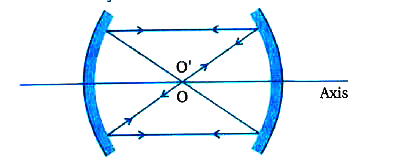
HINT:- A situation is depicted n the figure [ Note : A another possible situation for which object and its image coincide is when distance between mirrors is 4f ] .View SolutionQuestion 143
(i) If f = 0.5 m for a glass lens, what is the power of the lens? (ii) The radii of curvature of the faces of a double convex lens are 10 cm and 15 cm. Its focal length is 12 cm. What is the refractive index of glass? (iii) A convex lens has 20 cm focal length in air. What is focal length in water? (Refractive index of air-water = 1.33, refractive index for air-glass = 1.5.)View SolutionQuestion 144
(i) If f = 0.5 m for a glass lens, what is the power of the lens? (ii) The radii of curvature of the faces of a double convex lens are 10 cm and 15 cm. Its focal length is 12 cm. What is the refractive index of glass? (iii) A convex lens has 20 cm focal length in air. What is focal length in water? (Refractive index of air-water = 1.33, refractive index for air-glass = 1.5.)View SolutionQuestion 146
A small candle, 2.5 cm in size is placed at 27 cm in front of a concave mirror of radius of curvature 36 cm. At what distance from the mirror should a screen be placed in order to obtain a sharp image? Describe the nature and size of the image. If the candle is moved closer to the mirror, how would the screen have to be moved?View SolutionQuestion 148
A tank is filled with water to a height of 12.5 cm. The apparent depth of a needle lying at the bottom of the tank is measured by a microscope to be 9.4 cm. What is the refractive index of water? If water is replaced by a liquid of refractive index 1.63 up to the same height, by what distance would the microscope have to be moved to focus on the needle again?View SolutionQuestion 153
(a) A giant refracting telescope at an observatory has an objective lens of focal length 15m. If an eyepiece of focal length 1.0cm is used, what is the angular magnification of the telescope?
(b) If this telescope is used to view the moon, what is the diameter of the image of the moon formed by the objective lens? The diameter of the moon is 3.48×106m, and the radius of lunar orbit is 3.8×108m.View SolutionQuestion 154
(a) A giant refracting telescope at an observatory has an objective lens of focal length 15m. If an eyepiece of focal length 1.0cm is used, what is the angular magnification of the telescope?
(b) If this telescope is used to view the moon, what is the diameter of the image of the moon formed by the objective lens? The diameter of the moon is 3.48×106m, and the radius of lunar orbit is 3.8×108m.View SolutionQuestion 155
A small pin fixed on a table top is viewed from above from a distance of 50cm. By what distance would the pin appear to be raised if it is viewed from the same point through a 15cm thick glass slab held parallel to the table? Refractive index of glass = 1.5. Does the answer depend on the location of the slab?View SolutionQuestion 159
A small telescope has an objective lens of focal length 140cm and an eyepiece of focal length 5.0cm. What is the magnifying power of the telescope for viewing distant objects when
(a) the telescope is in normal adjustment (i.e., when the final image is at infinity)?
(b) the final image is formed at the least distance of distinct vision (25cm)?View SolutionQuestion 160
A small telescope has an objective lens of focal length 140cm and an eyepiece of focal length 5.0cm. What is the magnifying power of the telescope for viewing distant objects when
(a) the telescope is in normal adjustment (i.e., when the final image is at infinity)?
(b) the final image is formed at the least distance of distinct vision (25cm)?View SolutionQuestion 163
(a) For the telescope described in Exercise 9.28 (a), what is the separation between the objective lens and the eyepiece?
(b) If this telescope is used to view a 100 m tall tower 3 km away, what is the height of the image of the tower formed by the objective lens?
(c) What is the height of the final image of the tower if it is formed at 25cm?View SolutionQuestion 169
A plano- convex lens of refractive index 1.5 and radius of curvature 30 cm is silvered at the curved surface. Now , this lens has been used to form the image of an object . At what distance from this lens, an object be placed in order to have a real image of the size of the object?View SolutionQuestion 177
A beaker contains water up to a height h1 and kerosene of height h2 above water so that the total height of (water + kerosene) is (h1+h2) . Refractive index of water is μ1 and that of kerosene is μ2 . The apparent shift in the position of the bottom of the beaker when viewed from above is :-View SolutionQuestion 184
The eye can be regarded as a single refracting surface. The radius of curvature of this surfac is equal to that of cornea (7.8 mm). This surface separates two media of refractive indices 1 an 1.34. Calculate the distance from the refracting surface at which a parallel beam of light wil come to focus. View SolutionQuestion 214
A plano convex lens fits exactly into a plano concave lens. Their plane surfaces are parallel to each other. If lenses are made of different materials of refractive indices μ1, and μ2, and R is the radius of curvature of the curved surface of the lenses, then the focal length of the combination is ......View SolutionQuestion 216
Two identical thin plano-convex glass lenses (refractive index 1.5) each having radius of curvature of 20 cm are placed with their convex surface in contact at the centre. The intervening space is filled with oil of refractive index 1.7. The focal length of the combination is :View SolutionQuestion 228
A beam of light from a source L is incident normally on a plane mirror fixed at a certain distance x from the source. The beam is reflected back as a spot on a scale placed just above the source L. When the mirror is rotated through a small angle θ, the spot of the light is found to move through a distance y on the scale. The angle θ is given byView SolutionQuestion 231
The refractive index of the material of a prism is √2 and the angle of the prism is 30∘. One of the two refracting surfaces of the prism is made a mirror inwards, by silver coating. A beam of monochromatic light entering the prism from the other face will retrace its path (after reflection from the silvered surface) if its angle of incidence on the prism isView SolutionQuestion 233
Two similar thin equi-convex lenses, of focal length f each, are kept coaxially in contact with each other such that the focal length of the combination is F1, when the space between the two lenses is filled with glycerin (which has the same refractive index (μ = 1.5) as that of glass) then the equivalent focal length is F2. The ratio F1:F2 will be :View SolutionQuestion 282
A beaker having water of refractive index of 43 water is filled upto 16 cm in it. As shown in figure, a concave mirror is kept 3 cm above the surface of water. If the object is place at the bottom of beaker and its image is ob tained from this mirror at 7 cm below the surface of water, then what will be the focal length of this concave mirror ? View SolutionQuestion 285
Light is incident normally on the face AB of a prism as shown in figure. A liquid of refractive index n is placed on face AC of the prism. The prism is made of glass of refractive index √3. The limiton n for which total internal reflection takes place on face AC is ...........
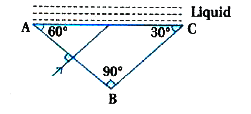 View Solution
View SolutionQuestion 289
As shown in figure, a plano-concave lens is placed in such a way that it becomes completely fit with plano-convex lens. Their plane surfaces are parallel. If their refractive indices are 1.6 and 1.5 respectively and radius of curvature is R, then focal length of combination is .....
 View Solution
View Solution
All Exercises from KUMAR PRAKASHAN KENDRA PHYSICS (GUJRATI ENGLISH) Class 12 PHYSICS RAY OPTICS AND OPTICAL INSTRUMENTS
- SECTION - A (QUESTIONS - ANSWERS)
- SECTION - A (TRY YOURSELF)
- SECTION-B (NUMERICALS)(NUMERICAL FROM .DARPAN. BASED ON TEXTBOOK )
- SECTION-B (NUMERICALS)(NUMERICAL FROM TEXTUAL EXERCISE)
- SECTION-B (NUMERICALS)(NUMERICAL FROM TEXTUAL ILLUSTRATIONS)
- SECTION-C (NCERT EXEMPLAR SOLUTION) (LONG ANSWER TYPE QUESITONS)
- SECTION-C (NCERT EXEMPLAR SOLUTION) (MULTIPLE CHOICE QUESTIONS (MCQS))
- SECTION-C (NCERT EXEMPLAR SOLUTION) (SHORT ANSWER TYPE QUESITONS)
- SECTION-C (NCERT EXEMPLAR SOLUTION) (VERY SHORT ANSWER TYPE QUESITONS)
- SECTION-D (MULTIPLE CHOICE QUESTIONS (MCQS))(MCQS ASKED IN COMPETITIVE EXAMS)
- SECTION-D (MULTIPLE CHOICE QUESTIONS (MCQS))(MCQS FROM .DARPAN. BASED ON TEXTBOOK)
- SECTION-D (MULTIPLE CHOICE QUESTIONS (MCQS))(MCQS FROM .DARPAN. BASED ON TEXTBOOK)(MCQS BASED ON TEXTUAL ILLUSTRATION AND EXERCISE)
- SECTION-D (MULTIPLE CHOICE QUESTIONS (MCQS))(MCQS FROM .DARPAN. BASED ON TEXTBOOK)(NATURAL PHENOMENA DUE TO SUN LIGHT )
- SECTION-D (MULTIPLE CHOICE QUESTIONS (MCQS))(MCQS FROM .DARPAN. BASED ON TEXTBOOK)(OPTICAL INSTRUMENTS)
- SECTION-D (MULTIPLE CHOICE QUESTIONS (MCQS))(MCQS FROM .DARPAN. BASED ON TEXTBOOK)(REFRACTION AND DISPOSION BY PRISM)
- SECTION-D (MULTIPLE CHOICE QUESTIONS (MCQS))(MCQS FROM .DARPAN. BASED ON TEXTBOOK)(REFRACTION)
- SECTION-D (MULTIPLE CHOICE QUESTIONS (MCQS))(MCQS FROM .DARPAN. BASED ON TEXTBOOK)(REFRACTION, MAGNIFICATION, POWER AND COMBINATION OF LENS)
- SECTION-D (MULTIPLE CHOICE QUESTIONS (MCQS))(MCQS FROM .DARPAN. BASED ON TEXTBOOK)(TOTAL INTERNAL REFLECTION)

